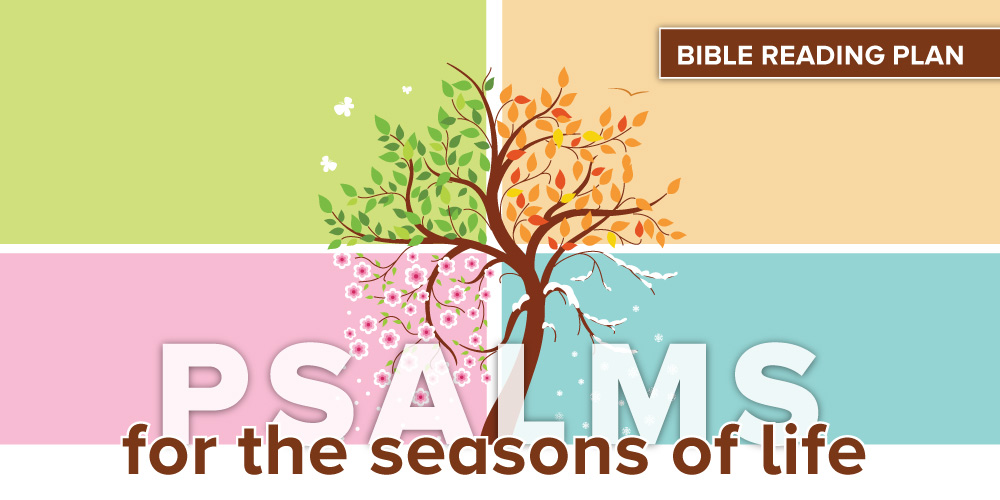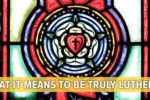 |
Jan. 1–7
Psalm 1 : “We often use the word law to refer to God’s commandments, in which he tells us what to do. But in this psalm and in many other passages of the Bible, the ‘law of the LORD’ refers to the whole Word of God, both law and Gospel. Law is the translation of a Hebrew word meaning ‘teaching’ or ‘instruction.’ Christians find their greatest joy in the gospel. . . . There are only two roads people can travel: the road of obedience to God, which leads to life, and the road of rebellion, which leads to hell. There are no other alternatives. Nothing in life is more important than being sure you are traveling on the right road” (PBP 1, pages 43-45).
Psalm 2: “The psalmist says ‘in vain,’ and in this word he summarizes nearly the whole subject of the psalm. For the prophet wishes to show that Christ is a King ordained by God the Father and that many . . . have not been able to hinder his kingship with their counsels, oppositions, strivings, and rages” (LW Vol. 14, 315). “If Christ will return to judge the world with almighty power, if every knee will bow to him, the lesson for the enemies of his kingdom is obvious. Bow to him in adoration or you will kneel before him in fear. . . . There is no refuge from him only refuge in him” (COP 1, p. 134).
Psalm 3: “When Absalom rebelled, friends of David, friends like Ahithophel, deserted him. . . . But because God was his shield, David could lie down and sleep in peace in spite of the foes arrayed against him. David appeals to God for help, and he rests his case with the Lord. . . When you are overwhelmed with troubles, turn to this psalm for a reminder of the security you have in the Lord. Cast all your cares on him. Try to put worry aside so you can sleep peacefully. Awake refreshed, confident of his help in the troubles that still lie ahead of you” (PBP 1, p. 52).
Psalm 4: “David appeals to God for relief from his affliction. He bases his plea on God’s righteousness and mercy and on the deliveries God has provided for him in the past. . . . If you ever feel your situation is hopeless, if you ever ask yourself what’s the use of being a Christian. . . . Even in the darkness of suffering, the light of God’s face will shine upon us. He will show us the goodness of his grace and deliver us in due time” (COP 1, pages 144-146).
Psalm 5: “Because we are God’s children through faith in Christ Jesus, we can come before him with all boldness and confidence, as dear children come to their loving father. . . . Because Christ has paid for every sin, you and I can appear before God with confidence. If it were not for Jesus’ death, this verdict of the law [that is, wicked and arrogant cannot stand in your presence] would be true also of us. . . . We would be excluded from his presence forever. But thanks be to God! We, who were his enemies, have become his beloved children through Christ” (COP 1, pages 151-152).
Psalm 6: “In all trials and afflictions man should first of all run to God; he should realize and accept the fact that everything is sent by God” (LW Vol. 14, 140). These words refer to a soul that is poor in spirit and has nothing left but crying, imploring, and praying in firm faith, strong hope, and steadfast love. The life and behavior of every Christian should be so constituted that he does not know or have anything but God, and in no other way than in faith” (LW Vol. 14, pages 140, 145-6). Note: Psalm 6 is the first of the seven penitential psalms. The others are 32, 38, 51, 102, 130, 143.
Jan. 8–14
Psalm 7: “When David asks for God’s help [because] he is innocent and righteous, he is not claiming that he is without sin or that he has no guilt before God. He is simply defending himself against the false charges of the Benjamites. The terms of this prayer are general enough that it may serve as the prayer of any believer who is slanderously accused. . . . God in heaven hears the cries of the oppressed. He will give them justice. When we see persecution, violence, and oppression in the world, we should pray with David, ‘Bring an end to the violence of the wicked, and make the righteous secure’ ” (COP 1, pages 164-165, 168).
Psalm 8: “The Lord our God is praised by huge galaxies and by tiny babies. . . . God created Adam and Eve to have dominion over the universe. . . . Through sin mankind lost the dominion over the earth that God had entrusted to his highest creatures, but God sent Christ as the second Adam. . . . Just as Adam brought death to all people, so Christ, the second Adam, won life for all people. . . . When we understand this truth, we can repeat the refrain of this psalm with greater appreciation: ‘O Lord, our Lord, how majestic is your name in all the earth!’” (PBP 1, pages 64, 66-67).
Psalm 9: “Revenge and repayment for sin are not evil when they are imposed by a just God. On the contrary, they are a reflection of his holiness, which cannot leave sin unpunished. . . . David also praises God for his judgment of the whole world. . . . David praises God for his faithful care of his people and for giving his people freedom to worship him. . . . David defends the fairness of God’s judgment against the ungodly. They have brought God’s punishment upon themselves by their rebellion against God and by their own treachery” (PBP 1, pages 69-70).
Psalm 10: “The anguished ‘why?’ expresses the bewilderment that a Christian often feels when it seems that injustice is triumphing. . . . David is troubled that the Lord is not acting as quickly as he should [and] seems to be neglecting his duty. . . . David assures God’s people, ‘The Lord is still on his throne. He watches over the weak. Though they delay for a while, his righteous judgments are sure to come. Be patient and you will see justice triumph in the end.’ Although the ungodly scoff at the threats of judgment, God’s justice will come” (COP 1, pages 191-192, 195).
Psalm 11: “This psalm offers words of comfort and encouragement in times of tumult and danger. It is especially valuable for those days when the current collapse in the values of society make the Christian feel like giving up. . . . Defeatists have always tried to discourage God’s people from persevering in the battle for the truth. . . . Today we see the visible church abandoning even basic doctrines of God’s Word. . . . We see the standards of morality and family life, which form the foundations of society, crumbling. . . . The remedy for evil times is not flight or surrender. It is faithfulness and endurance” (COP 1, pages 195, 197, 200).
Psalm 12: “The trial by fire is the most effective and reliable of all. Therefore the gospel [the words of the Lord] is called ‘silver tried by the fire’ to express its purity and spirituality. But it is called tried, pure, refined because it teaches only spiritual things. . . . Thus the gospel is called ‘silver,’ first, because it is precious . . . [and] makes the soul precious in the sight of God; second, . . . because it makes people solid and full . . . third, because it is heard far and wide. . . . Fourth, it is weighty, because it does not contain fables or superficial things, and it makes men serious and mature. . . . Fifth . . . it is modest and chaste and teaches modesty” (LW Vol. 10, pages 102-103).
Jan. 15–21
Psalm 13: “The four anguished cries, ‘How long?’ emphasize the intensity of David’s emotions. These questions are not requests for information but cries of distress and confusion. . . . Even God’s saints sometimes grow impatient under suffering . . . For a Christian life without suffering is the exception rather than the rule. . . . In anguish the godly cry for delivery. . . . Sometimes during trials we too may grow frustrated and impatient with God as David did. Often God’s purposes for allowing suffering in our lives will be unclear to us. . . . [Yet] in the end justice will prevail, and all things will work for the good of those who love God” (COP 1, pages 206, 208, 209).
For further reading: Romans 8:18-39.
Psalm 14: “These verses prove that no one can ever become righteous in God’s sight by observing the law, for all have sinned and come short of the glory of God. . . . But fools never learn. Today the unbelieving human race continues its headlong plunge to destruction, clinging to its folly and despising the wisdom of the gospel, which is its only hope. . . . When Christ returns and appears in the midst of his saints . . . we will rejoice (PBP 1, pages 79-80).
For further reading: Romans 3:10-12.
Psalm 15: “In this psalm David offers a partial description of the life of a child of God. Unlike the wicked who oppress others for their own advantage, God’s children strive to love their neighbors as themselves. . . . They disapprove of evil and honor those who do good. . . . Those who do these things will never be shaken. This emphasis on good works does not teach salvation by works. . . . Our works, motivated by Christian love, demonstrate the reality of our faith. On judgment day, Jesus will point to these works of love as evidence of our faith” (PBP 1, pages 81-82).
Psalm 16: “This is a messianic psalm that refers to the resurrection of Christ. . . . We can also use this psalm as our personal prayer, because Christ has won all the blessings of this psalm for us . . . We too have a delightful inheritance, because Christ has gone to prepare a place for us. Though we still must pass through physical death, Christ will keep our bodies safe at peaceful rest in the grave until he appears to call them to life again. Then we will enjoy eternal pleasures at his side forever” (PBP 1, pages 83, 86).
Psalm 17: “We ask God to search our hearts and to refine out any impurities. . . . We know that judged by the standards of his holy law we fall short, but because we are clothed in the righteousness of Christ, we are confident that we will receive a verdict of approval from God. . . . The Lord has shown his wonders to us in in the salvation he provided through Christ. . . . We can be confident that God will keep us as the apple of his eye and will shelter us in the shadow of his wings” (COP 1, pages 231, 233).
Psalm 18: “David declares his love for God and praises the Lord for the greatness of the deliverance which he had received. . . . David calls the many dangers he had faced death traps. . . . Even for a Christian who is confident of eternal life, the threat of death is overwhelming. . . . We will finally escape death’s coils only when the Lord calls us forth from the grave to eternal life. . . . As gospel, God’s majesty comforts us in the severest trial. As law, God’s majesty warns us never to trifle with his grace. . . . In these verses David describes his military victories. . . . Christ’s victories are described in similar terms” (COP 1, pages 240, 242-243, 246, 253).
Jan. 22–28
Psalm 19: “The Lord deserves our praise, not only for delivering us from enemies but simply because of [his] majesty and glory. . . . The beautiful orderly universe that the Lord created and still maintains gives silent testimony to the power and wisdom of its Creator. . . . As wonderful as the testimony of creation is, it nevertheless is limited. . . . In a series of balanced statements, the psalmist lists six name of God’s Word, six attributes of that Word, and six blessings that Word gives to believers . . . and illustrates the value of the Word by comparing it to gold and to honey (v.7-10). [The last verse could] be our daily prayer” (PBP 1, pages 96-101).
Psalm 20: “We should pray for our rulers as the Israelites prayed for David. . . . We should pray for the welfare and success of faithful rulers in the state and in the church. They are the shield which God gives to his people against evil men and false teachers. . . . One of the best things people can do for their pastors and leaders is to pray for them. . . . Whether we are praying for the church or for our nation, we put our trust not in any human power or plan but in the Lord” (COP 1, pages 265, 267-269).
Psalm 21: “The people thank the Lord for the blessings which he has given to their king. . . . [They] assure the king that a string of future victories waits for God’s anointed. Although these words can be applied to the victories of the kings of Judah, they are especially fitting when they are applied to David’s greatest son, King Messiah. . . . This is an appropriate prayer whenever the church faces attacks by its enemies. . . . These words will be fulfilled in the fullest sense on judgment day when Christ has accomplished the final defeat of all the enemies of God’s people. . . . How greatly we celebrate the victory of salvation” (COP 1, pages 270, 272-273).
Psalm 22: “This psalm is one of the most important of all the psalms. . . . ‘My God, my God, why have you forsaken me?’ Jesus used these words as his own prayer on the cross. . . . Jesus stands alone, betrayed by Judas, abandoned by his disciples, denied by Peter. His enemies are powerful and vicious. . . . We get the psalm’s answer to [his] question [Why?] The Father had let the Son die for the sins of his people so that he could give them eternal blessings. . . . Both the suffering and exaltation of [Jesus are] before us so that when he comes in glory, we may be among those who bow in joy, not among those who cower in fear” (COP 1, pages 273, 275, 279, 286, 290).
Psalm 23: “As the Good Shepherd, the Lord guides his sheep, feeds his sheep, and gives them rest. He leads them to his Word, where they find nourishment and rest for their souls. . . . [He] delivers them from the burden of sin and from futile efforts to save themselves by their own works. . . . The shepherd’s rod and staff can be used as weapons against wild animals and thieves; for his sheep they are comforting reminders of their security. . . . A king invited his most honored associates to live in his palace. . . . In heaven we will feast in safety forever because we will be secure from Satan and all our enemies. There we will dwell in the presence of our Good Shepherd forever” (COP 1, pages 292-293, 295-296).
Psalm 24: “Jesus is called the King of glory because he is true God and because he has defeated all the enemies of God’s people. He came in glory when he entered the world to die for our sins, but his glory was concealed, except to the eyes of faith. . . . Jesus comes in glory now through the gospel, and we welcome him with joy when we receive that Word in faith. Jesus’ glory will be more openly displayed when he comes to judge the world. When Jesus returns, the angels will gather all believers so that all of us can welcome him (1 Thessalonians 4:14). When Jesus returns in glory, he will receive from his people a royal welcome that will last forever” (PBP 1, pages 116-117).
Jan. 29–Feb. 4
Psalm 25: “The first and last [parts of the psalm] look outward [and] deal with the psalmist’s enemies and afflictions. The middle [part looks] inward [and deals] with [his] sins and his repentance. . . . [He] prays for guidance in godly living. . . . A Christian who is sorry for his sins also has the desire to avoid sin and to live a life pleasing to God. Here the psalmist expresses his confidence that the Lord will instruct him so that he will grow in faith and in his dedication to the Lord” (PBP 1, pages 117, 119).
Psalm 26: “At first reading this psalm sounds more like the prayer of the Pharisee (Luke 18:11) than the prayer of a godly man. Doesn’t David know that ‘all have sinned’? This cry of innocence, however, is not a claim of sinless perfection, but, like Psalm 7, it protests that [he] has done nothing to deserve the hatred of his enemies. . . . A child of God is marked by his love of his Father’s dwelling place. This is, first of all, the place where we meet the Lord through the means of grace” (COP 1, pages 312, 314-315).
Psalm 27: “David begins with a triumphant assertion of God’s power in his life. Two of the great blessings resulting from salvation are joy and security. . . . David’s greatest joy comes not from his wealth or his honors but from the freedom to worship. [His] greatest desire is that the Lord would preserve his freedom to worship. . . . He pleads with the Lord not to forsake him, even though he deserves such treatment because of his sins. . . . [This psalm] is an excellent prayer in times of adversity or sickness” (COP 1, pages 319, 322, 324).
Psalm 28: “As in so many other psalms, David again prays for deliverance from his enemies. . . . When our prayers are not instantly answered in the way we expect, we sometimes think that God has not heard our prayers or that he is indifferent. But he does hear all our prayers and will answer them in the ways that are best for us. If he does not give us what we ask for, he gives us something better. . . . After praying to God for his own needs and thanking God for the blessings he has received, David does not forget to pray for the rest of God’s people” (COP 1, pages 325, 328).
Psalm 29: “[This psalm] is quite different from the psalms that surround it. In the midst of psalms of trouble, it stands as an interlude of praise. . . . In this psalm [people] and angels are admonished to worship the Lord of all creation. He rules the whole world . . . ‘In his temple all cry, “Glory!” ’ is the key line of this psalm. . . . These words draw the obvious conclusion from the power of God revealed in the storm. All his creatures should stand before him in solemn awe” (PBP 1, pages 127-129).
Psalm 30: “[This psalm is] concerned with delivery from death [and appears] to have been written during David’s old age. . . . [He] was led from overconfidence and self-reliance to dependence on the power and goodness of the Lord. . . . Through adversity we are often turned from self-confidence and complacency to a humble trust in God. . . . God’s grace is the focus of this psalm. . . . In all things, even in death, we are more than conquerors through him who loves us” (COP 1, pages 333, 338).






